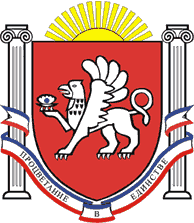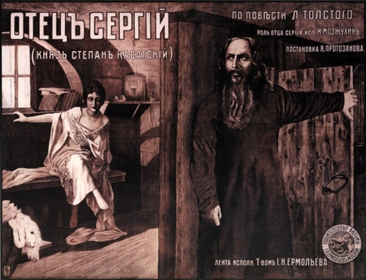![]()
Saint Sergius of Radonezh the Wonderworker (born in 1314, passed to Christ in 1392) is an ancient saint with enormous importance for the whole Christiandome and the Eastern Orthodox World.
He is perhaps the greatest ascet of the Russian land and a spiritual star who shone over the whole world sharing the and increasing the faith of Christ to shine upon many by his holy prayers. Saint Sergij Radonezhki is sometimes called in Russia the Abbot of the Russian land, for the reason he become the initiator (creator) and first abbot of the most notable and biggest monastery of Russia the Monastery of Saint Sergij of Radonezh in the XIV century.
In the Church service sung books, he is for that reason glorified calling him "a bright beacon of the Russian land, shining through its miracles like a second sun". Saint Sergius Radonezhki's monastery was established in Glory of the Most Holy Trinity and the great ascet following the earlier example and spiritual tradition bequeted of the Great ascet Saint John of Rila (Ioan Rilski) who lived in IX century in (876 – c. 946) who established in the Rila mountain, the most famous Rila Monastey in Bulgaria, saint Sergius started his spiritual endurance in Russia as an ascet and did not initially planned to create a monastery, but God who sees everything seing his great ascetism sent him monks, willing to learn true spiritual life and that is how the Radonezh Monastery was born. Monastery quickly become aprototype of a new, amazingly pure and strict monastic life in Holy Russia, centered near in Moscow and the monastery which become a Laurel (the slavonic word translated as Lavra), (meaning the inhibitants of the monastery were exceeding 1000 monks) since y. 1744, become known in worldwide as Holy Trinity-Sergius Lavra.
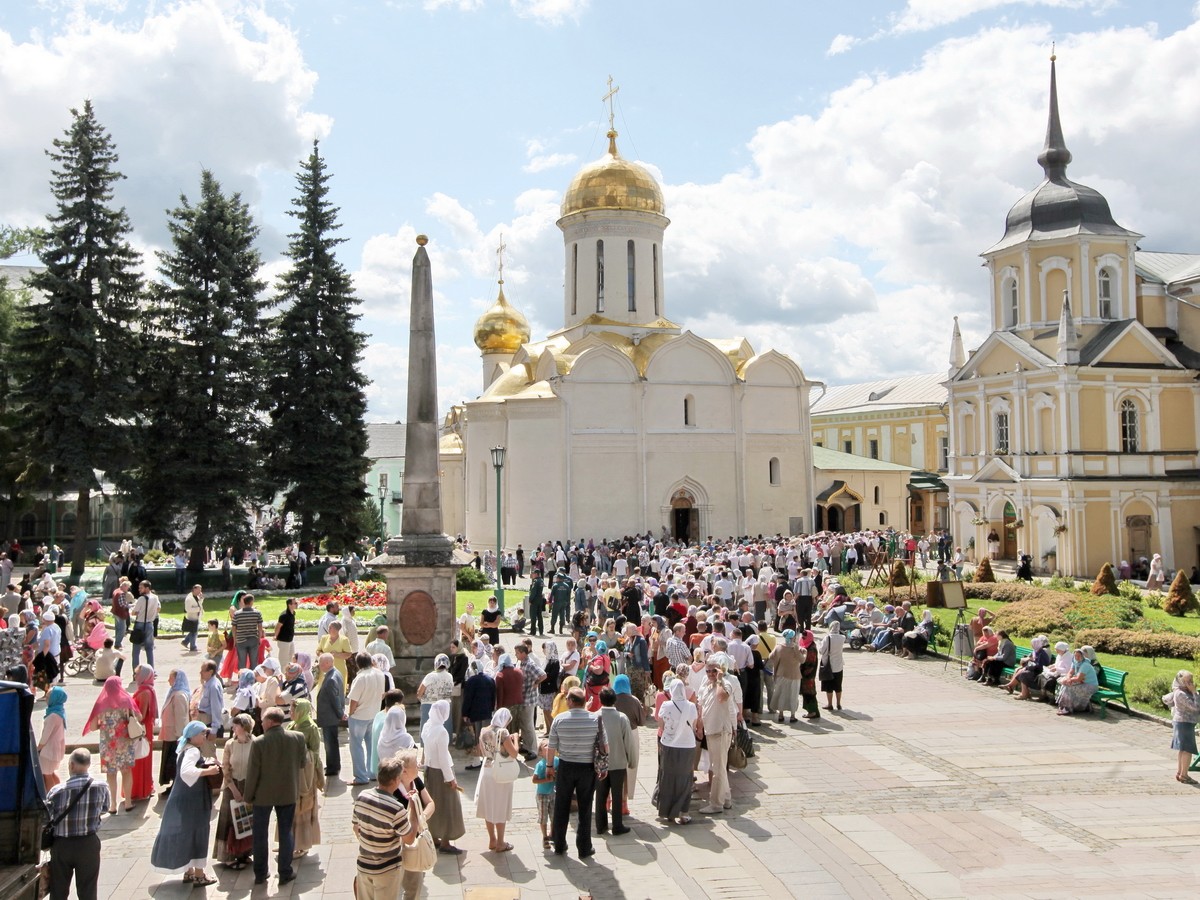
Just as the spiritual heart of Bulgaria is located in the Rila Holy Monastery (Rilski Manastir), where are the the holy incorruptable relics of most glorified saint Reverend John of Rila the Wonderworker, the Sergius Trinity lavra has emerged as most important spiritual center of Russia Kingdom and later Russian Empire. What was the spiritual significance for preventing the Orthodox Christian faith and shedding hope via the dark ages of Ottoman Turks slavery of Bulgaria, Reverend Sergiy Radonezhki was for Russia especially in the hard times when Russia was a small country and fought for their freedom and independence from the Tatars and other surrounding nations, who were constantly destroying parts of the then small kingdom of Rus. Thousands of pilgrims with reverence and gratitude have come and continue to come to the Trinity-Sergius Lavra for worship, near the monastery now is established the city of Sergiyev Posad (inhabited today with about 103 000 people).
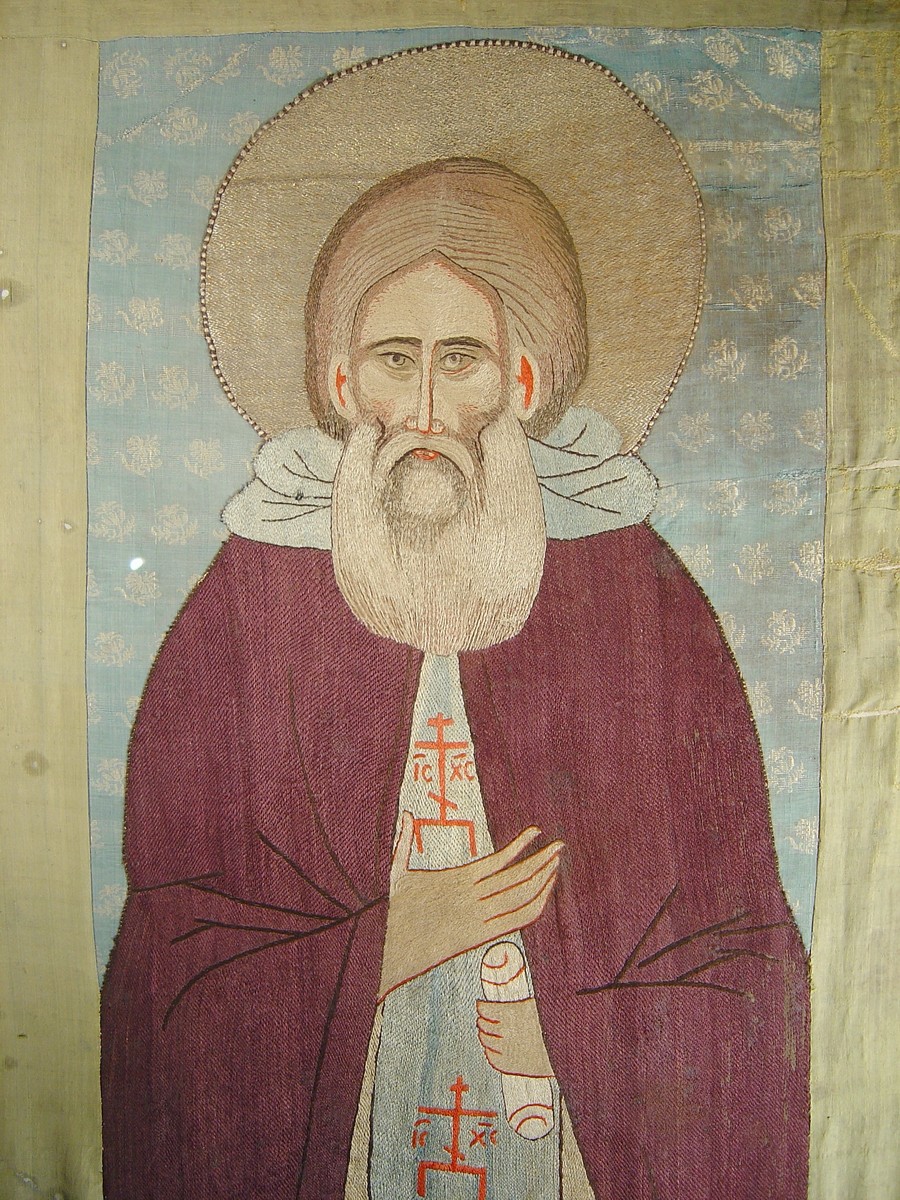
The shroud of the holy relics of Saint Sergius of Radonezh XV century
Prayers to St. Sergius of Radonezh are famous to protect you from any life problems. People pray to the saint to protect children from bad influences and from failures at school. The prayer to the saint who was a model of humility helps in achieving humility and subduing the pride of ourselves and others.
![]()
The very famous Holy Trinity unique icon held in main Church of Radonezh monastery painted by most famous Russian iconographer Saint Andrey Rublev
The icons and frescoes in the Trinity Cathedral in St Radonezh Lavra are unique piece of medieval art and were the work of Reverend Andrei Rublev and Daniil Chernyov in 1425. The main church icon that was painted in "praise of Rev. Sergius" is the old testamental visit the Holy Trinity to Abraham and Sarra icon – which is among the most famous and unique work of Russian icon painting.
The Church feast of the Saint Sergij
The memory of St. Sergius of Radonezh is honored 4 times a year:
1. October 8 – on the day of his presentation to God
2. June 5 – together with the feast of the Rostov-Yaroslavl saints
3. October 18 – on the day of the discovery of the relics of St. Sergius of Radonezh
(interestingly just 1 day after in the Church calendar is 19 of October is the main feast of Saint John of Rila)
4. and on July 19 – together with the Radonezh Saints Church.
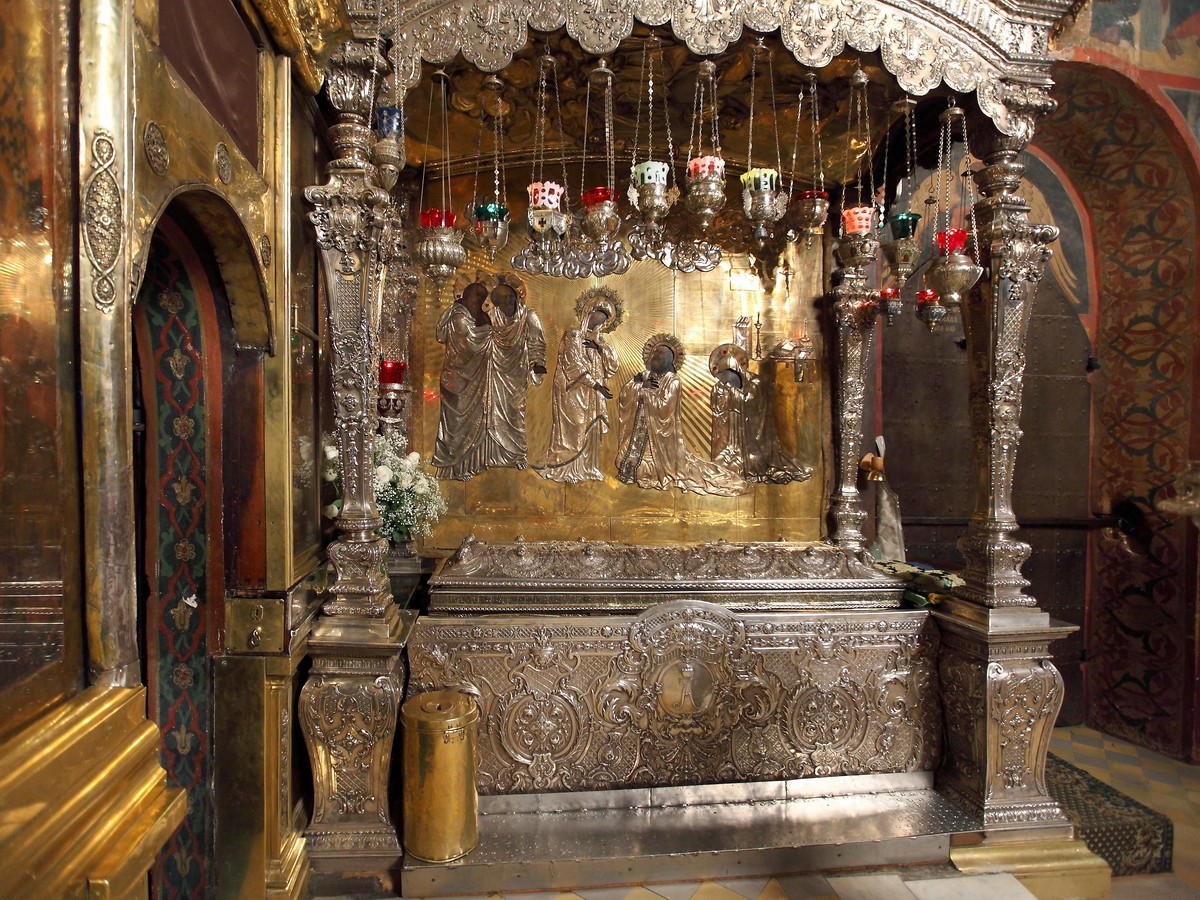
Reliquary with the incorruptable Holy Relics of Saint Sergij of Radonezh, kept in the Saint-Sergieva-Lavra monastery
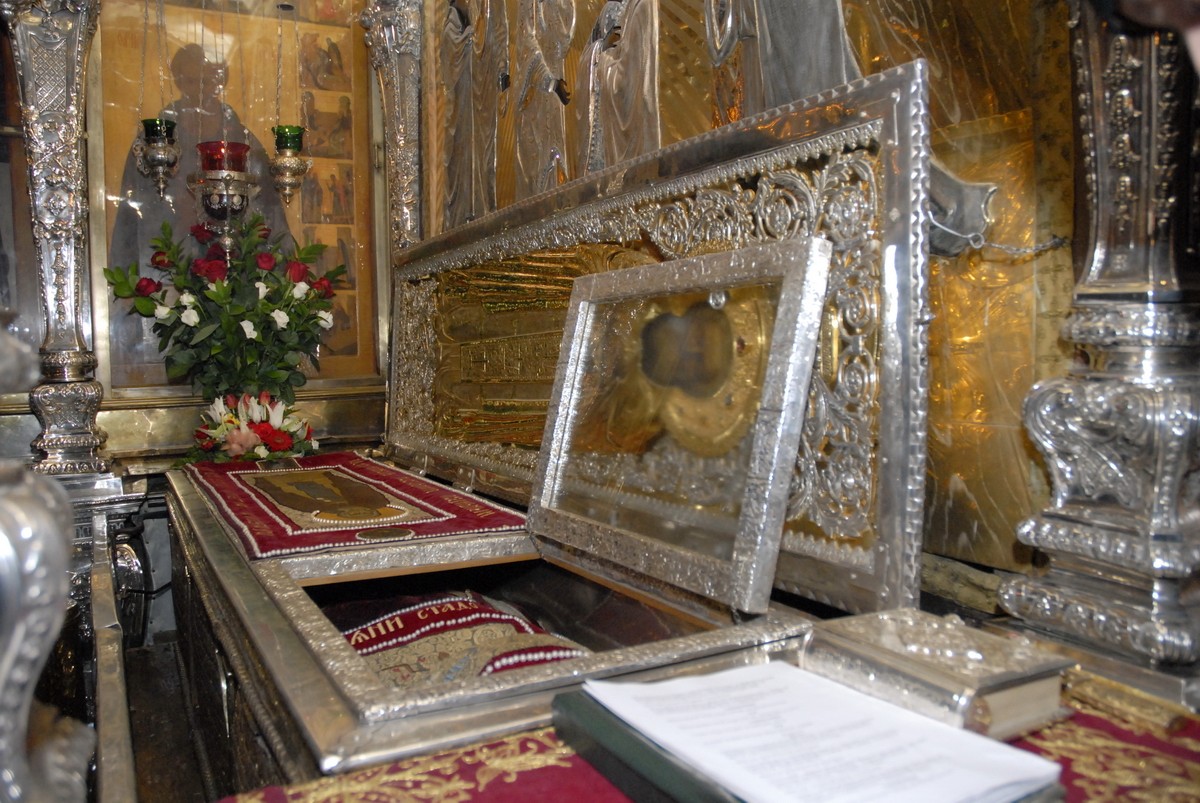
Opened reliquarium coffin with the incorruptable relics of saint Serigius of Radonezh (the feasts are opened for veneration by pilgrims 4 times a year during the saint feast veneration)
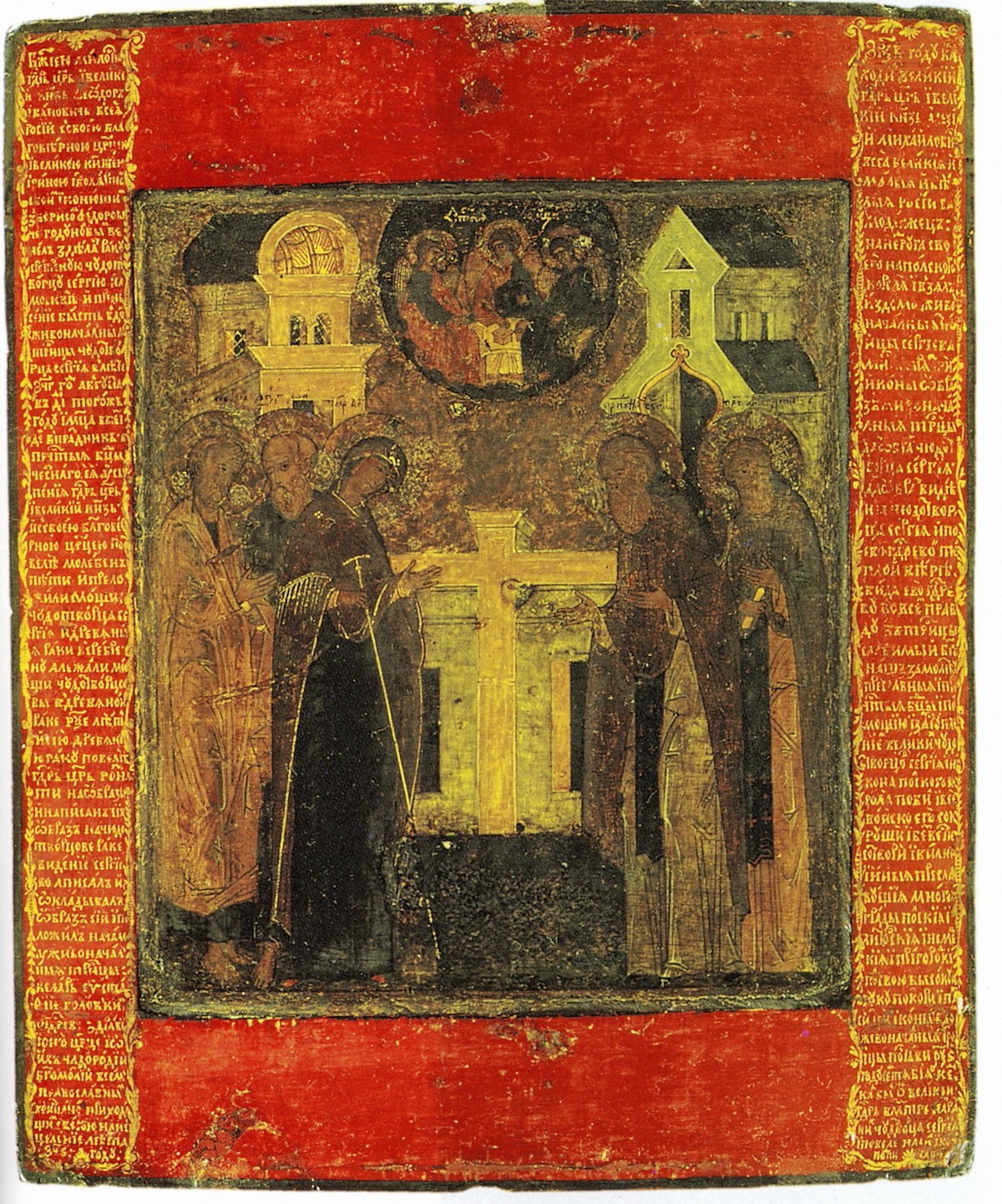
The Apparition of the Mother of God to St. Sergius 16th century icon
Short Living (Biography) of Saint Sergius Radonezhki
Sergius of Radonezh was one of the most famous political and historical figures of the 14th century.
He is the founder of the Trinity-Sergius Lavra, teacher and mentor of many Russian saints canonized by the Church.
According to ancient tradition, mainly from his student Epiphanes, Rev. Sergius was born in 1314 in the village of Varnitsa, Rostov in the family of the famous Rostov boyars Kiril and Maria (who are also canonized as saints) and in whose memory there are Churches consecrated in Russia and Belarus.
His parents named him Bartholomew at birth.
Although the family was noble, they lived very modestly and were very religious.
At the age of 7, Sergius and his brothers started going to school, and while his two brothers' education came relatiely easily, it did not for Bartholomew as for bartholomew learning was hard.
Suffering for his hardships to study even though he put great efforts to do so, as he did not have any other means to become proficient pupil like his brothers, wishing to change this, the boy fervently prayed to God to give him reason and strength to advance in learning.
According to the chronicles, the boy once he was looking for the lost horses of his father met an old schimonk elder who was praying to God. The boy asked the old man to pray for his success in school. The the unusual bright monk prayed and blessed him. Since then, the boy began to progress in his studies quickly.
In 1330, Bartholomew's parents moved to the village of Radonezh, near Moscow. Soon his parents died, and he, together with his older brother Stefan, left the inheritance to the youngest brother and took up a hermit life in the nearby forest, where they built a cell, and then built a small church, which was consecrated with the name of the Holy Trinity.
Soon Stefan decided to abandon the hermit life and went to the Moscow Epiphany Monastery, where he became abbot.
Bartholomew stayed and in 1337, at the age of 23, he was ordained a monk with the name Sergius.
The young ascetic spent more than a year in complete solitude. His life consisted of prayers, fasting and hard work.
Sergius became famous in the surrounding area and soon other monks began to come to him for advice and soon the brotherhood numbered 12 people. Each monk lived in a separate cell, and together they gathered for worship.
This is how the famous Sergius-Troitskaya Lavra was founded. In 1354, Sergius was ordained abbot.
As the biography testifies, Reverend Sergius of Radonezh performed miracles even in his earthly life:
"…
Pilgrims came, they saw the poverty of the desert, but they also saw the peace and grace among the brothers, and they brought this leaven into their native families like light, like salt. And the name of the God-pleaser became glorious throughout Russia and many came to him with faith. Once, by praying, the old man healed a seriously ill person, and another time he healed a mad nobleman who was not in his right mind, ranting and fighting, so that ten they couldn't hold the man back."
St. Sergius of Radonezh was honored with a vision of the Most Holy Mother of God, who appeared to him during a night service and said:
"Do not be afraid, My chosen one. I have come to visit you. Do not grieve, because your prayer for the students and the monastery has been heard; and your abode shall abound in all things; not only in your life, but also in your presentation before God. I will not leave this place, and will irrevocably supply all that is necessary, preserve and protect it with my covering."
Saint Sergius of Radonezh knew how to act with "quiet and meek words" even on the most hardened and cruel hearts and in this way reconciled even ruling country region principles and kings at war.
Thanks to him, all the princes united before the Kulikovo battle, thanks to whom Russia managed to establish itself as a leading world country in the mid-centuries recognizing the main role of the Moscow prince Dimitriy.
The Russian army received a blessing from the venerable Sergius of Radonezh before the upcoming battle with the Tatars.
He predicted (prophecised) the victory over the Tatars, and on September 8, 1380, on the feast of the Nativity of the Virgin, the Russian troops defeated the Tatars at Kulikovo field, marking the beginning of liberation from the Tatar yoke. In other words at the time when Bulgarian Empire had crashed and has been enslaved, the Trnov kingdom fall down in 1393 and Vidin's kingdom of Bulgaria in 1396, just few years before the opposite hapened in Russia. Already baptized by many Bulgarian clergymen and given the Old Bulgarian Church language so called in newer times the Church Slavonic Books, Russia together with its spiritual flourishment managed to liberate from the Tatars and increasing gruadally in influence, countryland and power.
Prince Dimitrii deeply respected his spiritual father – the Reverend Sergius of Radonezh, who was also the godfather of his children.
Sergius of Radonezh died on September 25, 1392, reaching a very old age.
He predicted his death 2 years before and appointed his successor – his student Reverend Nikon.
St. Sergius of Radonezh was buried in a monastery founded by him, and 30 years later his body and clothes were found incorruptible and odoring with heavenly odor.
This happened in 1422 during the construction of the new and enlargened "Life-giving Trinity" church.
Shortly before the construction began, Sergius of Radonezh appeared in a dream to a pious man, telling him to convey the following words to the brothers:
"Why do you leave me so long in the grave, buried in the ground with all this water, it is narrow here for my body. "
When they dug for the foundations, the imperishable relics and clothes of St. Sergius of Radonezh were found unharmed, and the grave was full of water.
During the consecration of the Trinity Church, the relics of the saint were transferred to it, where they lay even to this day.
Let by the Holy Prayers of Saint Sergius of Radonezh the world, find more peace, love, faith and brotherhood, which we desperately need in these day of the absurd brother shedful war in Ukraine.
Holy Reverend Father Sergij of Radonezh, pray the Lord Jesus Christ to save our souls and grant repentance to us sinners and peace to rule again in our hearts !
